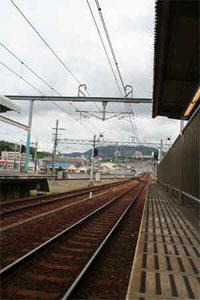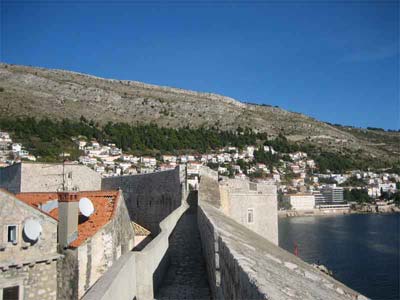Semester at
Sea Fall
2006 Voyage 
Crossing the Globe:
A New Transnational Vernacular
By Esther Cha


Both Dubrovnik of Croatia and Kobe of Japan have gone through tragic warfare and both have been successful in working through the aftermath of war, strongly emerging as a new blend of the vernacular and now transnational society.
Japan has always been an inwardly facing nation, choosing, when possible to avoid contact with the outside world. But since the first heralding of trade came across the ocean, Japan was locked into the path (along with all other nations of the world) to globalism.
Croatia is similar in how it became sucked into this transitional global society. It seems as if that no place on this earth is exempt from this increasingly global community. Even in the most rural plains of Africa the effects of transitional commercialism is making its way into the daily lives of the indigenousness people. " The Gods Must Be Crazy " is a great movie that depicts this exact situation- one of confusion, integration, and frustration at trying to adjust to this new type of society.
The war in Croatia is fresher than the war in Japan but today it ' s difficult to see the scars of the recent war if you didn ' t purposely search beyond the surface. In their book Fear, Death and Resistance: An Ethnography of War: Croatia 1991-1992, Lada Cale Feldman et al address the difficulty of studying this situation: " Scientific language often seemed too cold and selective for this difficult and chaotic reality ... there is a certain thread ... morally questionable and almost dubious in the incentive for culturological ' scientificaion ' of the war " - even with artillery shells laying along the paths in the hill and the morale of the inhabitants still weary from the trama of war I saw first hand the strength of the human spirit as postwar reconstruction renovated Dubrovnik into the quaint city that seems like it never saw the terrible face of war before.
In our increasingly intergrated society today, the world seems like a much smaller place than it had been just a few decades ago. Foucault basically states the proverbial " no man is an island " argument in his " Of Other Spaces " article. Even in introverted societies like Japan, it ' s becoming more and more impossible to not interact with the world around them. One cannot possibly survive in today ' s world alone and isolated. There is conscious attempt to " change the symbolic meaning of certain spaces " according to Donald M. Seekins ' " State and the City: 1988 and the Transnational Formation of Rangoon." Today as we consciously attempt to sever or neutralize historical connections with what we think things should be, we are creating a transnational apolitical binding that is becoming one of the common threads that we all share.
However, there are some not altogether positive things that do happen with this growing global society. In "After the World Trade Center- Rethinking New York City " by Michael Sorkin and Sharon Zukin, they discuss how terrorism is taking on a new meaning in the global arena. Now actions are taking on more symbolic values and as such the prominent icons of the transnational globe are being targeted to make certain points. In " Fear, Death, and Resistance: Poetics of Resistance " they explore the complexity of the negative side of humans and how vulnerability is dealt with once such situations happen.
Both Croatia and Japan are war struck countries but they have both been able to pull themselves out from that unfortunate situation and have situated themselves quite nicely into the new transnational vernacular that exists today.
course home page